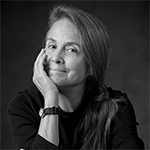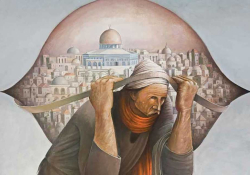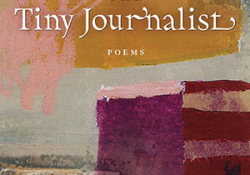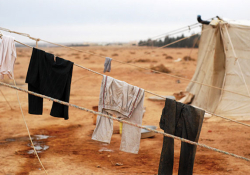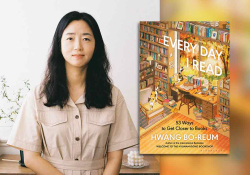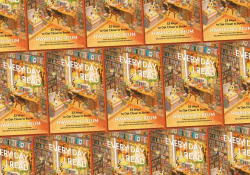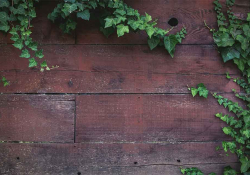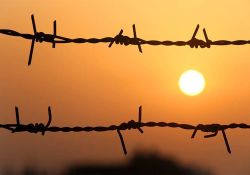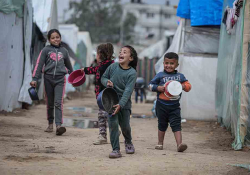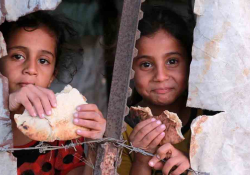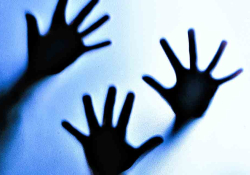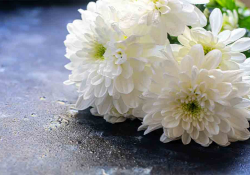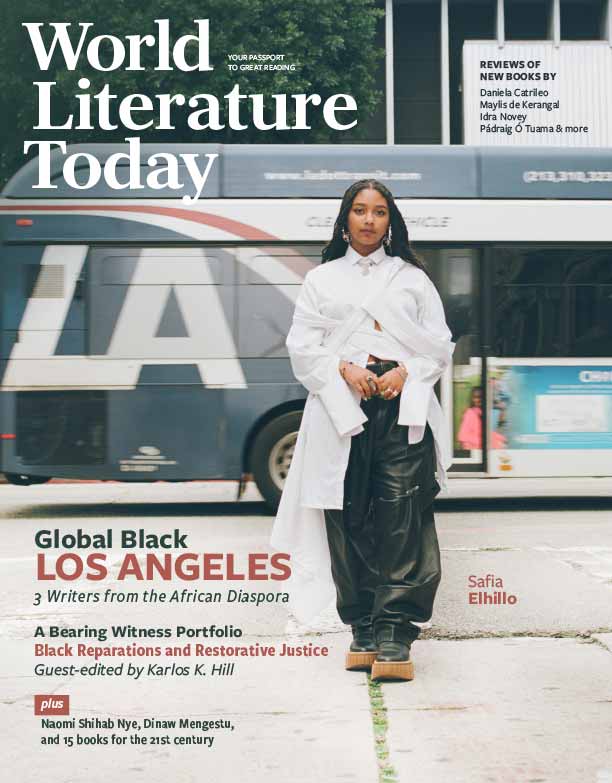Goodbye to Everything and Everybody
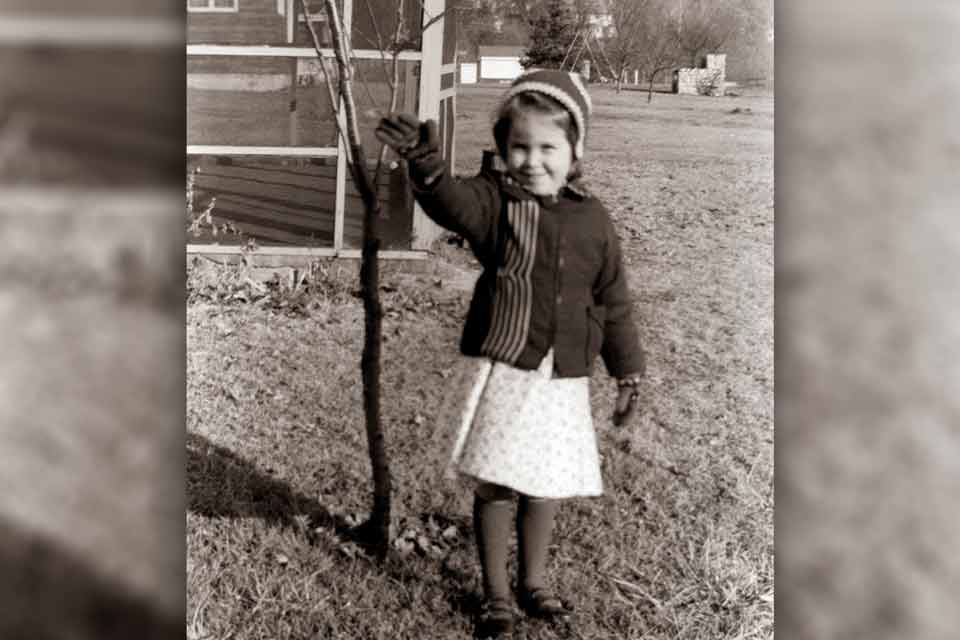
Naomi Shihab Nye recalls the “precious tender threadbare glory of each day” she experienced as a child who was not in a hurry to grow up.
They thought I was waving hello, but no. Walking out by myself into gray skies, gray streets, an enormous cloud of nostalgia surrounding me every waking moment, an almost intolerable sense that everything was vanishing even as we witnessed it. No one talked about this. You could smell the river even from a distance. It colored us all. White petals curling on our two skinny cherry trees would not be in blossom long. I walked to school by myself from the age of six on. Now that seems impossible. How were we so confident? Getting to school involved crossing a creek, climbing a hill, various turns. I always made it there and home again, only once attacked by a never-before-seen dog who leapt up and bit me on the cheek, under the eye, for no reason. Stitches—but no scar. Young skin heals. After that strange encounter, they still let me go alone. Sometimes I’d catch up with another girl or two, and we’d pick our favorite houses out on any block. I liked the one with no paint because it seemed sad. Always that sense of disappearing, being temporary on the earth, always afraid my mother might dissolve in my absence. How could I have known she would be with me till she was ninety-four? She was so thin, translucent sometimes, full of tears, more tears than a baby—what was she always crying for? No one told me. Sometimes she didn’t even seem to know. Her shiny ponytail . . . from the back she looked happy. We lived in the cradle of mystery, but it felt exquisite.
Under my bed, shoeboxes of scrappy papers, lines about cities and squirrels, tiny prayers for everyone.
Under my bed, shoeboxes of scrappy papers, lines about cities and squirrels, tiny prayers for everyone. We raised our hands to our lives, welcoming them in. We waved goodbye when we had to, and I knew I was waving goodbye every single day. What was coming next? What was wrong with me? I did not want to grow up even for a minute. When people talked about future ambitions, what they dreamed of being, I turned my head away. In order to reach any future, we would have to say goodbye to a blue bowl of oatmeal made by someone else, placed on the table next to one small silver spoon. Folded laundry on the bed quietly welcoming us home from school. Saturday story hour at the library, where Robert Louis Stevenson and Margaret Wise Brown were still alive telling us dreamy things we wanted to hear more than once. I’d think—I’m not giving this up. I don’t want to be in the front seat. I don’t want a bank account, a driver’s license. My quarters lived in a striped sock with holes, tucked into the drawer. No one would find them. Go on without me. The future waits for you. Give me open screens at night, breeze waffling through, enormous pine trees, lines of tulips in the yard. My grandmother rang us up just to say hello, but otherwise that little black telephone on its shrine in the hallway cubbyhole rarely jangled. No one needed us, I didn’t need them either. Mostly Grandma and I rode buses downtown, dining in department stores, Famous & Barr, Stix, Baer & Fuller. She bought me luscious eclairs and chocolate pie with whipped cream if I wanted it, something my mother would never have done. Once I saw a doll as big as I was and asked for it. At Christmas when my grandma turned up lugging that oversized smiling doll wearing clothes, with gleaming eyes and bangs, my mother glared at me. She knew I must have asked for it. Where did she ever go? Next year Grandma brought me a guitar. I received few other messages except from fences and gates, green yards, tangled bushes, acorns, twigs, and clouds drifting silently above, echoing the river, and the pavement. We were in the center. Of the country, the world, our lives.
We were in the center. Of the country, the world, our lives.
But how could childhood be the center? You had to be grown up longer than you got to be a child. This did not feel fair. No one had heard of Ferguson except people who lived there or next door in Florissant or Cool Valley. Some people in downtown St. Louis had never even been to Ferguson. I knew people who lived in Kinloch right beside us and wondered why we didn’t get to be together. Later that would change and Ferguson would become famous for sad reasons. Who knew? Who could ever guess? We were invisible and we liked it. I was afraid of tornadoes, water towers, spiders. I knew a girl who said she couldn’t wait to grow up because then she’d be free. I stared at her. Are you kidding? We’re free now. Don’t you feel how free we are? When I thought about being older, it felt like doom, separation, struggle, loss of empty hours, grief, crying, painful knees like my grandma had, tight black shoes, no running through a vacant lot, no muddy hours, no secret cookies from Grandma’s closet. And people would die. So many people. And you might have to live longer without them. How could anyone stand it? Fifty years later, one friend from our block would round us up again. Eight of us. We would sit in a circle in our same old field. Still empty. Tall grasses still waving. What was the secret in your house? he asked. One said, my parents never stopped drinking. Another, my brother used to lock me in the closet. I said, my mother cried all the time, I tried to hide it from you. They only remembered her smiling. What I couldn’t say—I loved our lives too much. We were there together. Close to the ground. We knew things. The precious tender threadbare glory of each day. And my heart was broken broken broken because, like the worst loser-Buddhist there could ever be, I wanted it to stay.
San Antonio, Texas
Editorial note: Excerpted from Snapshots: An Album of Essay and Image, edited by Dinah Lenney, courtesy of Bloomsbury Academic. Copyright © Dinah Lenney and Naomi Shihab Nye, 2025.
